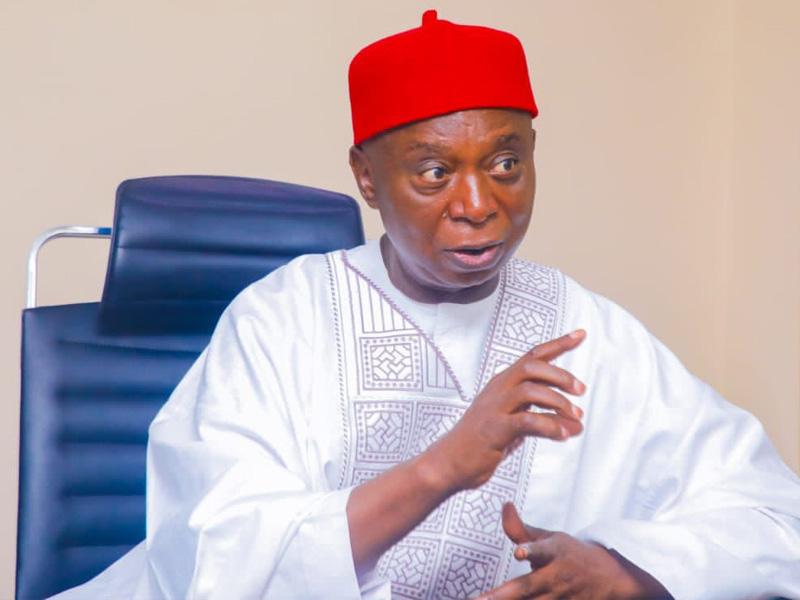The political landscape in Delta State, Nigeria, is heating up as the 2027 general elections draw closer. Senator Ned Nwoko, a prominent member of the All Progressives Congress (APC) representing Delta North, has publicly declared that the APC will unseat the incumbent governor, Sheriff Oborevwori, of the Peoples Democratic Party (PDP). Nwoko’s declaration, made during a high-profile defection ceremony of PDP members to the APC, further intensifies the already charged political atmosphere in the state. He emphatically stated that Oborevwori is not welcome in the APC and will be defeated in the upcoming election. This strong stance underscores the deep-seated rivalry between the two parties and sets the stage for a potentially fierce contest in 2027. The defection event, attended by key APC figures including National Chairman Abdullahi Ganduje, Edo State Governor Monday Okpebholo, and former Deputy Senate President Ovie Omo-Agege, signifies a strategic move by the APC to strengthen its foothold in Delta State.
Nwoko’s pronouncements directly address persistent rumors of Governor Oborevwori’s potential defection to the APC. While the governor’s aides have consistently denied these rumors, Nwoko’s comments suggest that such a move, if true, would not be welcomed by the APC’s existing power structure. Nwoko linked the governor’s alleged interest in joining the APC to President Bola Tinubu’s reported ambition to secure Delta State for the ruling party in the 2027 elections. He argued that the APC doesn’t need the governor’s membership to win Delta, expressing confidence in the party’s growing influence in the state. He attributed the APC’s rising popularity to what he termed 25 years of corrupt governance by the PDP, urging party supporters to solidify their commitment to the APC’s victory.
Ovie Omo-Agege, echoing Nwoko’s sentiments, stated unequivocally that neither Governor Oborevwori nor his predecessor, Ifeanyi Okowa, would be accepted into the APC. While acknowledging the APC’s openness to new members from the PDP, Omo-Agege drew a clear line against these two prominent figures, further escalating the political tension between the parties. Omo-Agege claimed that over 60% of PDP members in Delta State have defected to the APC since the 2023 general elections, indicating a significant shift in political allegiances and boosting the APC’s confidence in its ability to win the state in 2027. He projected a clean sweep for the APC in all elective positions from the presidency down to state assembly seats.
The statements from Nwoko and Omo-Agege not only underscore the ongoing political power struggle in Delta State but also reveal deeper underlying issues. Both leaders reiterated their support for the creation of Anioma State, a long-standing demand in the region. They accused the PDP of intentionally obstructing the creation of the new state to maintain its political grip on the current Delta State structure. This accusation adds another layer of complexity to the political dynamics, suggesting that the battle for control extends beyond party lines and touches upon fundamental issues of statehood and regional autonomy. The renewed focus on the Anioma State issue could become a key factor in shaping the political landscape as the 2027 elections approach.
In response to these developments, the Delta State PDP Publicity Secretary, Sunday Apah, reaffirmed the party’s stance that Governor Oborevwori has no intention of defecting. He attempted to reframe the narrative surrounding the defection rumors by attributing the speculation to an APC lawmaker, Francis Waive, who reportedly suggested that the APC adopt Oborevwori as its governorship candidate for 2027. Apah presented this as evidence of Oborevwori’s broad acceptance across Delta State, portraying the governor as a unifying figure who transcends party lines. This strategic communication attempts to downplay the significance of the defections and project an image of stability within the PDP.
The unfolding political drama in Delta State highlights the complex interplay of ambition, party loyalty, and regional interests. The contrasting narratives presented by the APC and PDP reflect the high stakes involved in the upcoming elections. While the APC projects confidence in its growing strength and its ability to unseat the incumbent governor, the PDP maintains a posture of stability and dismisses defections as insignificant. The competing claims and accusations add to the intrigue and uncertainty surrounding the 2027 elections, setting the scene for a potentially highly contested and dramatic political showdown. The battle for Delta State is likely to be a key indicator of the broader political trends in Nigeria as the country heads toward the next general elections.














